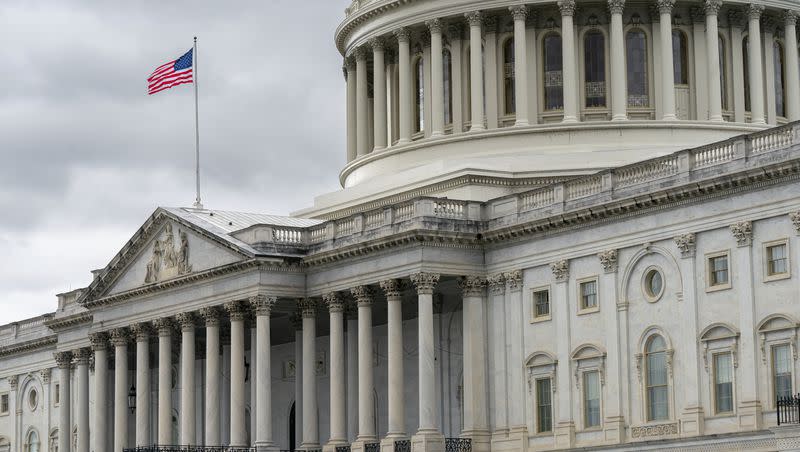Does Congress get paid during a shutdown?

The U.S. government appears to be heading towards its fifth “true” shutdown as lawmakers struggle to come to a compromise on how, or whether, to continue government funding beyond Saturday’s deadline.
While a shutdown would halt “nonessential” government services and suspend hundreds of thousands of federal employees with no pay until funding is legislated, the nation’s elected representatives in the House and the Senate will continue to see their paychecks roll in.
The 27th Amendment to the Constitution prohibits the Department of Treasury from “varying the compensation for the services of the Senators and Representatives” between elections.
But an assortment of lawmakers, including Utah Republican Rep. John Curtis, who are concerned about a dysfunctional Congress being compensated while congressional staff and federal employees are not, have proposed several variations of a bill that would bring the consequences of legislative inaction home to roost.
Prospect of a shutdown
Amid stalled talks in the House, where a handful of House Freedom Caucus members have opposed any attempt to pass a temporary spending bill, in the name of returning to “regular order,” the Senate is preparing its own “continuing resolution” to keep the government funded at current levels while lawmakers work through the 12 annual spending bills.
But the inclusion of over $6 billion in Ukraine funding in the Senate’s stopgap funding proposal has caused some senators, including Republican Sens. Rand Paul, R-Ky. and Mike Lee of Utah, to object to quick passage of the bill, delaying a floor vote until Sunday at the earliest, ensuring at least a small shutdown unless the House can produce a continuing resolution in a surprise turn of events.
Related
Efforts to cut lawmaker pay during government shutdowns
Curtis, who represents Utah’s 3rd Congressional District, introduced his No Work, No Pay Act on Friday, for the third time since he entered office.
The bill would obligate the payroll administrator of the House and the Senate, in addition to the secretary of the treasury, to exclude payments to members of Congress during each day of a government shutdown. If passed, the statute would not be active until after the next election cycle — in compliance with the 27th Amendment.
“The American people expect Congress to do its most basic job: pass a budget and fund the government. If we can’t, then we shouldn’t get paid,” Curtis said after introducing the bill for the first time in January 2019, during the longest government shutdown in U.S. history.
Curtis’ legislation would apply anytime there is “a lapse in appropriations for any Federal agency or department as a result of a failure to enact a regular appropriations bill or continuing resolution.”
As he has done in the past, Curtis plans on requesting that the House clerk withhold his pay until an appropriations agreement is finalized for the coming fiscal year.
Curtis’ Democratic colleague Rep. Angie Craig of Minnesota has introduced similar legislation, called My Constituents Cannot Afford Rebellious Tantrums, Handle Your (MCCARTHY) Shutdown Act in a stab at Republican House Speaker Kevin McCarthy.
If enacted, Craig’s legislation would also withhold congressional compensation each day of a government shutdown. But it also includes a special rule for the current Congress which would halt payments to lawmakers during any shutdown in coming weeks but would ensure back pay of withheld compensation on the last day of the term.
A bill proposed by Reps. Brian Fitzpatrick, R-Pa., and Abigail Spanberger, D-Va., in May is nearly identical to Craig’s and Curtis’.
Sens. Tim Kaine, D-Va., and James Lankford, R-Okla., have both introduced legislation in the Senate to prevent government shutdowns and incentivize lawmakers to focus on the appropriations process.
If passed, the bills would both initiate an automatic continuing resolution upon reaching the appropriations deadline. Kaine’s bill would prevent lawmakers from advancing non-appropriations legislation following the end of the fiscal year and Lankford’s would require lawmakers to stay in Washington seven days a week to work through each of the 12 spending bills until a final budget is passed.
Why are we headed toward a government shutdown?
Despite the end of the fiscal period coming at the same time every year, Congress has failed to pass even one of the 12 annual spending bills through both the House and the Senate.
Instead, party leadership has relied on the passage of a continuing resolution, a temporary funding measure, to buy them 30-60 days to work through the appropriations process — just as they have done 44 out of the last 47 years.
Related
However, House Republican holdouts have stymied McCarthy at every turn — rejecting his attempts to pass a temporary funding measure and embarrassing him with more failed rule votes in one week than the previous two decades.
Now, as McCarthy struggles again to formulate a stopgap funding bill that can pass through his narrow Republican majority, some members of the conservative House Freedom Caucus are saying they will never support a “continuing resolution” and that a protracted government shutdown might be necessary to catalyze a dramatic shift in the way Congress approaches spending.
Despite McCarthy’s plans to pass four appropriations packages through the chamber this week on top of a continuing resolution, a government shutdown seems likelier than ever as a handful of House Republicans double down on “holding the line” amid calls from former President Donald Trump on Sunday to “Shut it down!”, in all caps, unless all demands are met.

